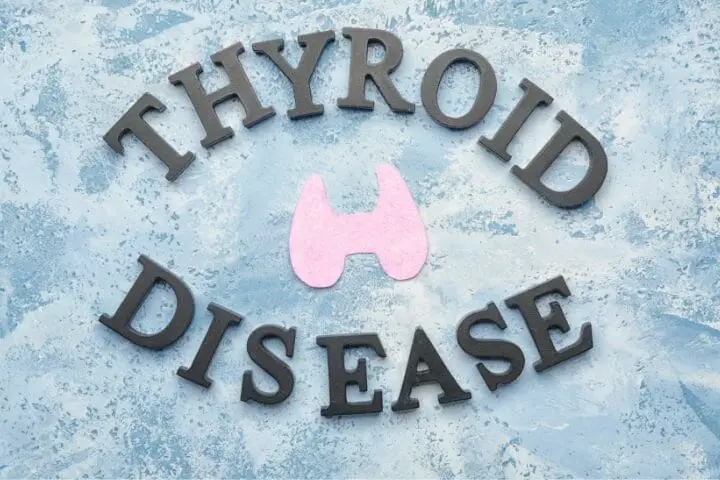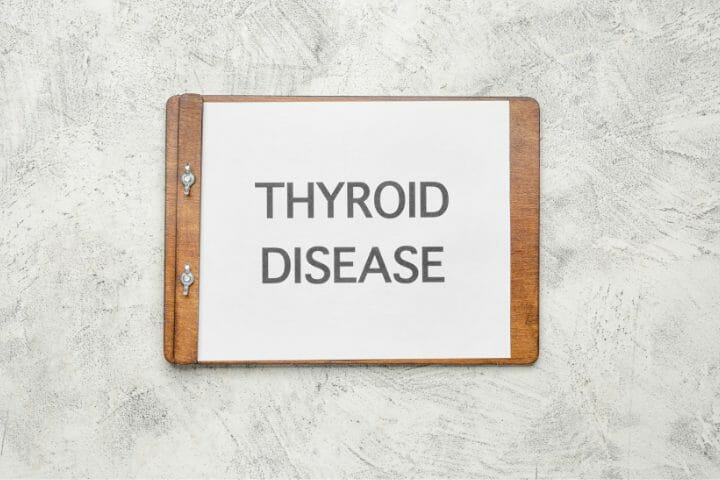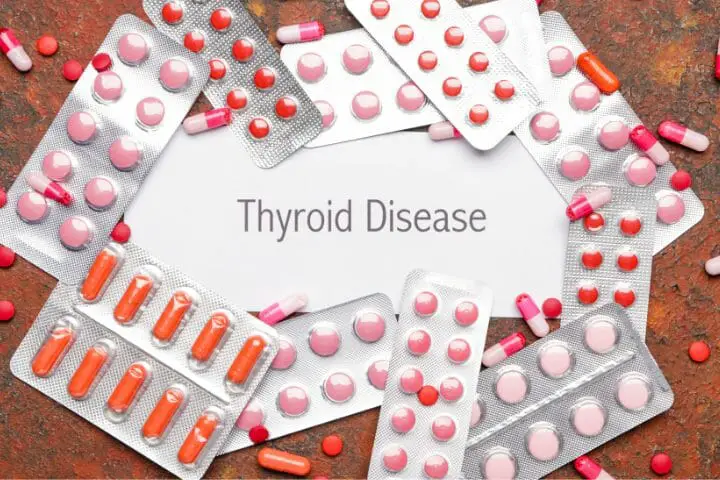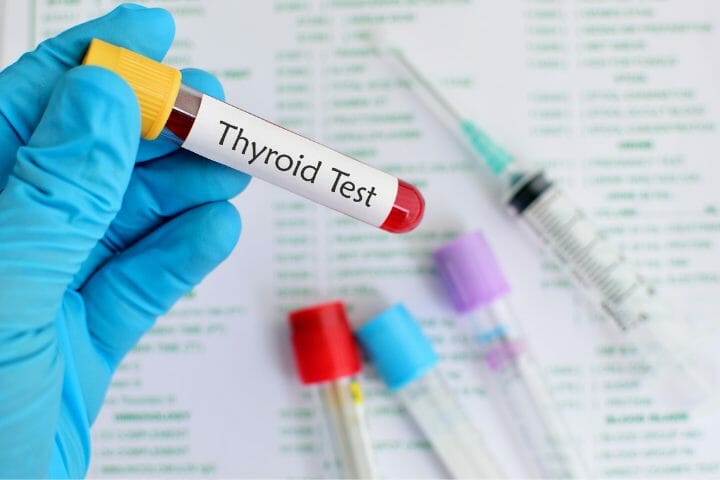The thyroid gland regulates important functions in the body. Its imbalance leads to several problems. Can you get disability for thyroid disease? Yes, you can provided you understand which listing you need to file your disability claim under. Read on to know more.
Contents
There are a lot of illnesses and diseases out there that can make it difficult for you to work. One of those diseases is thyroid disease.
Thyroid disease can make it hard for you to concentrate, remember things, and even speak. Nearly 19% of all females and 13% of all males were suffering from thyroid disease in 2017.

If you have thyroid disease and are having trouble working because of it, you may be able to get disability benefits. Read further to learn more about getting a disability for thyroid disease.
What Are Thyroid Disorders And Their Critical Symptoms?
The thyroid is a gland in the front of the neck, just below the voice box (larynx). Thyroid hormone helps the body stay warm, use energy, and keep the muscles, brain, heart, and other organs working.
The thyroid gland make thyroid hormone secreted into the blood and then carried to every tissue in the body.
Several disorders can affect the thyroid gland. These include:
Hyperthyroidism
This situation occurs when the thyroid gland produces excess thyroid hormone levels. Symptoms may include weight loss, increased appetite, anxiety, irritability, heat intolerance, sweating, and rapid or irregular heartbeat. Hypothyroidism is when the gland does not make enough thyroid hormone. Symptoms may include weight gain, fatigue, constipation, depression, and cold intolerance.

Goiters
A goiter is an enlargement of the thyroid gland. Goiters can be caused by many things, including iodine deficiency, Graves’ disease, Hashimoto’s disease, and certain types of tumors. Goiters are usually not harmful, but they can cause difficulty swallowing or breathing in some cases.
Thyroiditis
Thyroiditis results in an inflammation of the thyroid gland. There are different types of thyroiditis, including autoimmune thyroiditis (the most common), subacute thyroiditis, postpartum thyroiditis, and silent thyroiditis. Thyroiditis can be associated with temporary hypothyroidism or hyperthyroidism.
Thyroid cancer
Although thyroid cancer is relatively rare, it is the most common type of endocrine cancer. There are several types of thyroid cancer, including papillary, follicular, Hurthle cell, and anaplastic. Treatment for thyroid cancer usually involves surgery to remove the thyroid gland, including radioactive iodine therapy and radiation therapy.

Graves’ Ophthalmopathy
This is a medical condition in people with Graves’ disease. The muscles and fatty tissues behind the eyes become swollen, causing the eyes to bulge out (“Proptosis”). This can lead to vision problems, double vision, and pain in the eyes.
Thyroid Nodule
A thyroid nodule is a lump or growth in the thyroid gland. Most thyroid nodules are benign, but some may be malignant (cancerous). Thyroid nodules are usually found during a physical exam but may also be seen on imaging tests, ultrasounds, or CT scans.
Hashimoto’s Disease
This disease is an autoimmune thyroid gland disorder. In Hashimoto’s disease, the body attacks the thyroid gland, leading to hypothyroidism.
Autoimmune disorders happens when the body’s immune system attacks and destroys healthy tissue. Symptoms of Hashimoto’s disease may include fatigue, weight gain, cold intolerance, and constipation.

Graves’ Disease
Graves’ disease is another autoimmune thyroid gland disorder. Like Hashimoto’s disease, the body attacks the thyroid gland in Graves’ disease.
However, in Graves’ disease, the body over-stimulates the thyroid gland to produce too much hormone (hyperthyroidism). Symptoms of Graves’ disease may include weight loss, anxiety, irritability, heat intolerance, sweating, and irregular or rapid heartbeat.
You might also like to read: Can You Get Disability For Hashimoto’s Disease?
How Much Does Treatment of Thyroid Gland Disorders Cost?
The cost of treating thyroid gland disorders can vary widely, depending on the specific condition and the severity of symptoms. In some cases, treatment may be as simple as taking a daily pill, while surgery may be necessary for others.
The medication cost will also vary depending on the type and brand prescribed. In general, however, the cost of treatment for thyroid gland disorders is typically not covered by insurance plans.
For those who do not have insurance coverage, the cost of treatment can be a significant financial burden. The good news is that many options are available to help offset the costs associated with treatment. Various government programs can assist nonprofit organizations that offer financial assistance to those in need.

Can You Get A Disability For Thyroid Disease?
Yes, you can get a disability for thyroid disease. The Social Security Administration (SSA) recognizes that thyroid disease can be a disabling condition. For your disability claims to qualify for benefits, you must be able to show that your condition is severe enough to prevent you from working.
The SSA will consider the following when determining if you are disabled:
- The type of thyroid disease you have
- How well you are responding to treatment
- The severity of your symptoms
- Your ability to perform daily activities and function at work
If you have been diagnosed with a thyroid condition and are having difficulty working, you may want to consider applying for disability benefits. An experienced attorney can help you navigate the process and give you the best chance at obtaining the benefits you need and deserve.
You might also like to read: Can You Get Disability For Autoimmune Disease?
Meeting A Disability Listing For Thyroid Disorders
If you have a thyroid disorder, you may be able to meet the requirements for a disability listing. There are two primary listings for thyroid disorders:

1. Endocrine disorders include thyroid gland disorders (Listing 9.08).
To meet the listing for an endocrine disorder, your condition must cause one of the following:
- Disruption of adrenal gland function
- Disruption of gonadal function
- Disruption of pancreatic function
- Hypoglycemia that is not effectively controlled by medication and diet
- Thyroid gland dysfunction resulting in myxedema coma
2. Immune system disorders include autoimmune diseases like Hashimoto’s disease (Listing 9.14).
To meet the listing for an immune system disorder, your condition must cause one of the following:
- Autoimmune hemolytic anemia
- Goodpasture’s disease
- Grave’s disease
- Hashimoto’s disease
- Idiopathic thrombocytopenic purpura (ITP)
- Myasthenia gravis
- Pemphigus Vulgaris or other bullous dermatoses are not effectively controlled by medication and diet.
You must have documentation from a licensed medical professional to meet either listing. This can include your treating physician and medical records from hospitals or clinics. The documentation must show that you have a qualifying condition and that it meets the listing requirements.
If you do not meet or equal a listing, you may still be found disabled if your condition prevents you from working. The Social Security Administration (SSA) will consider your age, education, past work experience, and any limitations caused by your condition when deciding. If you cannot work due to your thyroid disorder, you may be eligible for disability benefits.

Can You Get A Disability For Graves Disease?
Yes, you can get a disability for Graves’ disease. The Social Security Administration (SSA) recognizes Graves’ disease as a condition that can cause disabling symptoms. To qualify for disability benefits, you must be able to show that your symptoms are severe enough to prevent you from working.
Graves’ disease is an autoimmune disorder that severely affects the thyroid gland. The thyroid is a small gland in the neck that produces hormones that regulate the body’s metabolism.
In people with Graves’ disease, the immune system mistakenly attacks the thyroid gland and causes it to produce too much of the hormone thyroxine. This can lead to several symptoms, including anxiety, weight loss, irritability, tremors, sweating, and rapid heart rate.
If you have Graves’ disease and your symptoms are so severe that you cannot work, you may be eligible for SSD benefits. You must show that your condition meets or equals a listing in the SSA’s Blue Book of disabling conditions to qualify for benefits. The listings for endocrine disorders include a listing for graves’ disease.
To meet the listing for Graves’ disease, you must have:
- An enlarged thyroid gland (goiter)
- A serum thyroxine level that is greater than 20% above the normal range AND a serum triiodothyronine level that is greater than 10% above the normal range OR
- A serum thyroxine level that is greater than 10% above the normal range AND a serum triiodothyronine level that is greater than 20% above the normal range
You might also like to read: Can You Get Disability For Back Problems?
Can You Get A Disability For Hypothyroidism?
Hypothyroidism is when the thyroid gland doesn’t produce enough of the hormone thyroxine. This can lead to various symptoms, including fatigue, weight gain, and depression.
While there is no cure for hypothyroidism, it can be treated with medication. In some cases, however, the condition can be severe enough to interfere with daily activities and work. When this happens, people may wonder if they can qualify for disability benefits.
The Social Security Administration (SSA) does consider hypothyroidism to be a disabling condition. However, as with any other condition, the SSA will only approve disability benefits if the person’s symptoms are severe enough to meet their definition of disability.
Some of the listings in the SSA Blue book that are related to thyroid are:
- Listing 5.08 relates to unintentional weight loss that may occur due to thyroid disease.
- Listing 11.04 covers stroke related problems. Thyroid can also cause stroke.
- Listing 13.09 covers cancer caused in the thyroid gland.
- Listing 4.00 looks at heart problems, which can also be cause by thyroid disease.
- Listing 12.00 looks anxiety, depression, and other mood disorders. Thyroid disease can also cause these problems.

Medical Tests For Thyroid disorders
Several different medical tests can be used to diagnose thyroid disorders. The most common test is the blood test, which measures the level of thyroid hormones in the blood.
Other tests include the thyroid scan, which uses radioactive iodine to produce images of the thyroid gland, and the thyroid biopsy, which involves taking a small sample of tissue from the thyroid gland for examination.
Frequently Asked Questions
1. Is thyroid a long-term disability?
Several factors need to be considered when determining if the thyroid is a long-term disability. The first is the severity of the condition. If the thyroid condition is mild, it is less likely to be considered a long-term disability. However, if the condition is more severe, it is more likely to be considered a long-term disability.
Another factor that needs to be considered is the impact of the thyroid condition on the individual’s ability to work. If the thyroid condition significantly impairs the individual’s ability to work, it is more likely to be considered a long-term disability.
2. What problems can hypothyroidism cause?
Hypothyroidism can cause several different problems in the body. One of the most common problems is an increased risk of fatigue and lethargy. This can make it difficult to get through the day or participate in activities you enjoy.
Hypothyroidism can cause weight gain, dry skin, hair loss, and brittle nails. It can also lead to fertility issues and an increased risk for heart disease. If left untreated, hypothyroidism can be dangerous.
3. Is underactive thyroid considered a disability?
Yes, an underactive thyroid is considered a disability. This can cause several symptoms that can make everyday activities difficult or impossible to perform.
These symptoms can include fatigue, weight gain, depression, and muscle weakness. An underactive thyroid can lead to coma or even death in severe cases. If you have an underactive thyroid, you may qualify for Social Security Disability benefits.
4. What problems can hypothyroidism cause
Hypothyroidism, or an underactive thyroid, can cause several problems. The most common symptom is fatigue, but other symptoms may include weight gain, constipation, depression, and dry skin. Hypothyroidism can also increase the risk of heart disease, goiters, and infertility. Treatment for hypothyroidism typically involves taking synthetic thyroid hormone pills daily. In some cases, surgery may be necessary to remove the thyroid gland.
5. Does thyroid affect driving?
The thyroid is a small gland in the front of your neck. It is shaped like a butterfly. It creates hormones for the regulation of heart rate, metabolism, and body temperature. The thyroid also plays a role in brain development and function.
While the thyroid itself doesn’t directly affect driving, its hormones can indirectly impact it. For example, suppose someone with hypothyroidism (an underactive thyroid) doesn’t take their medication as prescribed.
In that case, they may experience fatigue and other symptoms that can make it difficult to focus on the task of driving. Additionally, some medications used to treat thyroid conditions can cause drowsiness or impair cognitive function, making it unsafe to operate a vehicle.
Wrap Up
The thyroid gland is a very important part of the body, and any disease that impacts it can cause a lot of problems. We have listed above the various types of diseases that can occur due to thyroid related problems, and how you can claim disability for those diseases.
Thank you for reading the article, we hope we have covered everything that you needed to know. If you need further assistance with your listing, or you have any doubts or queries regarding the information that we shared, do not hesitate to write to us.
